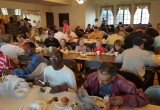Metro Theology: Resurrection in Appalachia
Huntington, WV, March 17, 2016 (Newswire.com) - For decades, America’s mainline religious denominations have battled dramatic declines in membership, financial support, and just about every other standard measure of what makes a church successful. (After peaking in the 1950’s, mainline church denomination membership in the U.S. has declined by nearly 33% percent, to 21 million from 31 million.)
But don’t tell that to The Very Rev. Dr. Chip Graves, Rector of Huntington, WV-based Trinity Episcopal Church. He adores his congregation and their love for Christ.
"This is the Jesus Movement. Now is our time to go." When Jesus called his first followers, he did it with the simple words "Follow me." Follow me. Follow me and I will show you how to become more than you ever dreamed you could be." (Speaking late last year at the Cathedral of St. John the Divine, Episcopal Presiding Bishop Michael B. Curry noted the exciting changes being embraced by the Episcopal Church.)
Michael B. Curry, Presiding Bishop
And together they have resurrected their church. New feeding programs now serve over 14,000 people each year. New worship services have nearly tripled their weekly attendance. New stewardship programs have increased their annual pledge by 25%. New educational programs have multiplied their Bible study attendance. Their food pantry now serves over 5,000 families with over 60,000 meals of groceries each year. Their anti-drug programs now support hundreds each year with addiction, unemployment, homelessness and medical care.Their partnership with local Marshall University medical students now serves thousands of people each year.
Because for the past few years, Dr. Graves and his congregation have been turning those statistics on their heads with Metro Theology, a unique program created by Dr. Graves that uses newly-formed, powerful partnerships between church, city, and state organizations to tackle some of the region’s toughest challenges.
A philosophical and moral imperative as well as a practical, action-oriented program, Metro Theology was designed to strengthen engagement between his church and his city.
Metro Theology – A Unique Approach to Asset-based Community Development
By design, Metro Theology focuses on discovering – and using – Huntington’s strengths; moving deeper into the community to and extending the reach of limited resources. Huntington mayor Steve Williams calls Metro Theology “a partnership that offers a unique approach to asset-based community development.”
With innovative outreach programs, strategic partnerships with other non-profits, and non-traditional opportunities for worship, Metro Theology is helping Trinity attract members and supporters with a fresh take on what it means to be a church member; win grants that fund its own and other local initiatives; and draw in new parishioners from that most-prized of demographics, the American family.
The program has also played a key role in reinvigorating a sense of Christian community both inside and outside church walls. “When you’re an urban,” Dr. Graves says, “you don’t have to look very hard for places to do good things. They’re right outside your sanctuary door.”
Mayor Steve Williams: It Takes a Village
Citing the old adage “it takes a village,” Williams adds that “Metro Theology has already had an enormous impact on our city when it comes to addressing poverty, homelessness, drug addiction, crime, and other societal problems.”
By stepping outside Trinity’s walls to create ecumenical and interfaith alliances and partnering with local nonprofit organizations and the city, Graves and others are addressing, at the grassroots level, the challenges facing Huntington. Dr. Graves describes Metro Theology as a Christ-centered strategy for partnering a church with another local business or non-profit to develop new ministries that can lift up underserved members of the community and have a positive impact on serious issues like homelessness, addiction, unemployment, and health care.
Metro Theology’s Four Steps to Success
In laying the groundwork for what would become Metro Theology, Trinity:
- Conducted a church-wide survey in 2012 that identified the congregation’s goals, challenges and assets.
- Surveyed its immediate city neighborhood and challenges such areas faced.
- With a team that included Dr. Graves, Mayor Steve Williams, and parishioners who had found renewed enthusiasm for doing God’s work in the world, outlined specific areas for the development of new ministries
- Began to theologically reflect on the new ministries and their impact, working together to discern: Where is Christ in these new endeavors? Are there signs of Resurrection and new life? Are there signs of Baptism and transformation? This Metro Theology process takes one on a journey of self-reflection and how we may help others, given our resources, traditional and non-traditional. This process allows one to more deeply discern and therefore connect Christ’s teachings
People really stepped up to the plate, says Dr. Graves.
“If we were to succeed, both clergy and congregation had to let go of the old ‘dependency’ model of the clergy-congregation relationship,” he observes. “Church leadership could no longer be the sole provider of spiritual sustenance. In a re-invigorated Trinity, we are all responsible for what takes place. Everybody has to step outside their comfort zone.”
Learn More About Metro Theology Might Work in Your Community
Trinity Episcopal Church in Huntington, West Virginia has successfully partnered with its city and other nonprofit and business groups to actively address local challenges like drug addiction, unemployment, youth education, homelessness, and the development of local fine arts projects.
The concept of Metro Theology transcends specific Christian denominations. To learn more, visit http://www.wvtrinitychurch.org/ or MetroTheology.com.
Media Contact:
The Very Rev. Dr. Chip Graves, Rector
Trinity Episcopal Church
520 11th Avenue, Huntington WV 25701
E: therevchipgraves@gmail.com I T: 304.529.6084 I wvtrinitychurch.org
(Caption photo 1: Resurrection is new life. The Rev. Dr. Graves baptizing newborn at Trinity Episcopal Church; photo 2: Feeding thousands with food and the Gospel at Trinity Episcopal Church)
RESOURCES:
- www.wvtrinitychurch.org/metro-theology.html
- www.metrotheology.com
- http://episcopaldigitalnetwork.com/ens/2015/09/09/metro-theology-fosters-church-community-engagement/
- https://www.youtube.com/watch?v=WSnFEzbe_x0
- https://books.google.com/books?isbn=1498226388
- huntingtonquarterly.com/articles/issue92/churches-part-1.php
###
